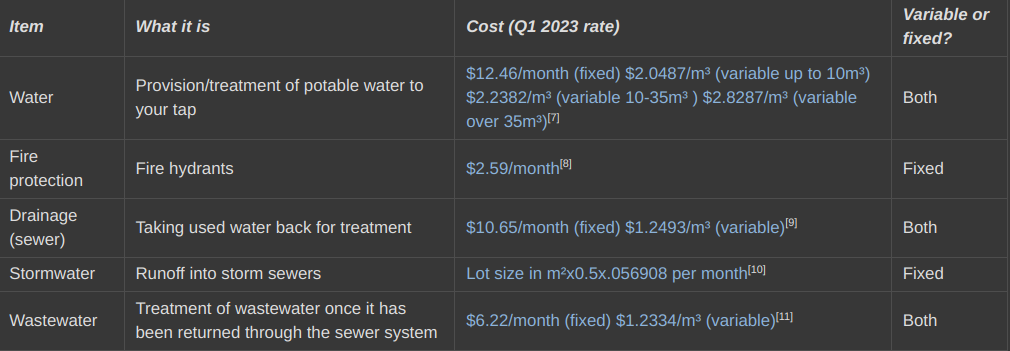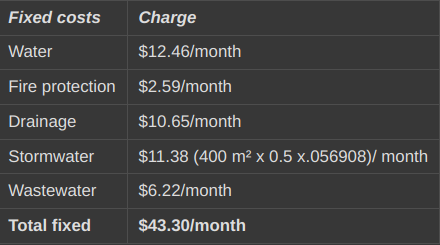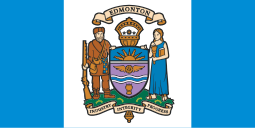Credit: /u/Anabiotic on Reddit
EPCOR has a monopoly on water, drainage and wastewater services in Edmonton. All rates (fixed and variable) are regulated by the City of Edmonton, who is also the sole shareholder of EPCOR; EPCOR applies to the City with a cost-of-service application, and the City approves it, which sets the next period’s rates. You can read a summary of their rate application here, and the detailed applications here.
Water services consist of three different streams: water, drainage (including stormwater) and wastewater. Each of these three streams has a separate rate application and separate fixed and variable rates. In essence, the same cubic metre of water is charged for three times, once by each service, to cover the water’s round trip to and from the North Saskatchewan River. Despite their name and function, drainage and wastewater charges do not depend on the actual volume of wastewater sent down the drain, as they’re based on your metered water usage.
Water is billed by the cubic metre (1,000 L). EPCOR estimates the average Edmonton home will use 13.2 m³ per month in 2023 (page 25). Given the average household size is approximately 2.6, that suggests average usage of about 5m³ per person per month, though is not exactly linear. Per capita water consumption has dropped and EPCOR forecasts it to continue to drop in the coming years.
Differences between water and power/gas bills
EPCOR’s water bills are easier than understand than utility bills from power and gas retailers, and generally do a fair job of breaking down fixed and variable costs, which are the most important things to understand about the bill.
Unlike power and gas, GST is not charged on water, wastewater or drainage services. EPCOR also does not charge a separate administration fee for water services as that cost is rolled into the rates.
Overview of fees/charges
Water is the only utility where the rate changes based on usage, as there are three cost tiers based on consumption level (<10m³/month, 10-35m³/month, and over 35m³/month).

Like power and gas, the City of Edmonton levies a franchise fee, which is a municipal tax, on water bills. Currently, that charge is set at 8% of water/wastewater/drainage/stormwater charges. Unlike the gas and power franchise fees, this is not separated out on your bill, and is hidden in the base rates charged by EPCOR.
EPCOR also charges a rate of return for providing water services, which presumably forms part of the dividend paid to the City of Edmonton. The rate of return is currently set at 5.5% for drainage and 9.95% for water/wastewater until April 2023, though EPCOR argues it should be 9.95% for all utilities (the rate of return the AUC allows for electric and gas utilities is currently 8.5%, but EPCOR believes water services are riskier to provide and therefore deserve a higher rate of return); the “discount” is being phased out over the next several years, which will lead to increasing drainage rates beyond costs/inflation. Overall markups above the strict cost of service total ~16% for 2022-23 (8% franchise fee and average 8% EPCOR rate of return across all three water utilities).
The fire protection item above was covered by property taxes until 2022, when the City moved it onto utility bills as an additional charge.
Stormwater above is treated as fixed as it’s same month to month for the same lot, but will vary from property to property based on lot size, as shown by the calculation in the table.
Variable
Below is a calculation of variable costs of water:

Each cubic metre of water costs about $5 (or $0.0045/L), depending on usage level.
Fixed
The total fixed components of the water bill (with a lot size of 400 square metres) is:

This means you would pay $43.30 per month for water services before using any water.
Usage
A low-usage household using 6 m³ per month with a 400m² lot would pay $43.30 + $4.53/m³ x 6m³ = $70.49, of which fixed charges are 61%.
A high-usage household using 20 m³ per month with a 400m² lot would pay $43.30 + $4.53m³ x 10m³ + $4.72/m³ x 10m³ = $135.82, of which fixed charges are 32%.
Managing your bill
Unlike power and gas, there is only one way to reduce your water bill – use less water. This could include water-efficient appliances, limiting watering lawns, using rainwater for gardens, taking shorter showers, making sure appliances are in good repair (no running toilets), etc.
deleted by creator
One reason I left Ontario was bills like this. I would use $20 of water and have a total bill of $83 because of fees
Stumbled across this in /all but it’s worth leaving a comment for: your compilation of data and explanation of the mathematics is thorough, well formatted, and the kind of effort deserving of recognition.


